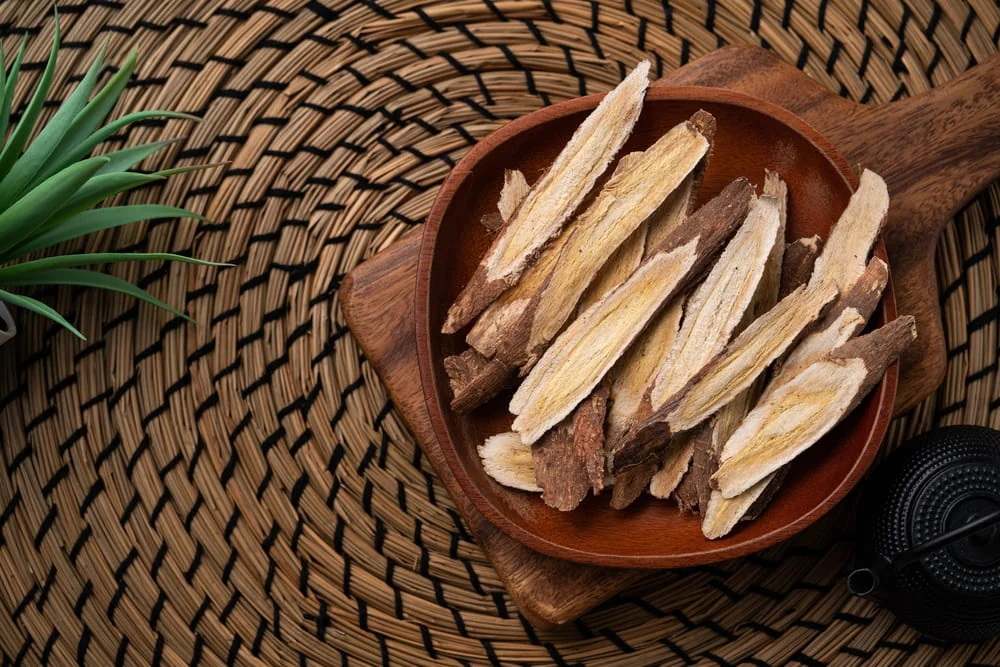Used for thousands of years in Traditional Chinese Medicine (TCM), astragalus (Astragalus membranaceus) is a powerful adaptogenic herb known for its ability to strengthen the immune system, support energy levels, and promote longevity. With growing interest in natural wellness, astragalus has stepped into the spotlight as a versatile remedy backed by both ancient wisdom and modern science.
Whether you’re looking to boost your body’s defenses or manage chronic fatigue, astragalus could be a potent addition to your wellness routine.
What Is Astragalus?
Astragalus is a perennial plant native to Asia, particularly China and Mongolia. The root is the part most commonly used for medicinal purposes and is usually found in the form of:
- Dried slices (for teas and soups)
- Powders
- Capsules and tablets
- Liquid extracts or tinctures
Astragalus contains several active compounds that contribute to its healing properties:
- Polysaccharides: Strengthen immune function
- Saponins: Support heart health and cholesterol balance
- Flavonoids: Offer antioxidant and anti-inflammatory effects
- Amino acids and trace minerals: Nourish the body at a cellular level
Key Health Benefits of Astragalus
1. Boosts the Immune System
Astragalus is most renowned for its immune-enhancing effects. It stimulates the production of white blood cells, which are essential for fighting off infections.
- Helps reduce the frequency and severity of colds and flu
- May enhance resistance to viruses and bacteria
- Often used as a supportive herb during chemotherapy to help restore immune function
2. Supports Energy and Reduces Fatigue
As an adaptogen, astragalus helps the body resist stress and restore balance. It’s particularly helpful for those suffering from:
- Chronic fatigue syndrome (CFS)
- Adrenal fatigue
- General low energy or burnout
Many people report feeling more vital, alert, and resilient when taking astragalus regularly.
3. Anti-Aging and Longevity
Astragalus contains antioxidants that protect cells from oxidative damage, one of the key factors in aging. Some studies suggest it may help:
- Reduce signs of aging in the skin
- Protect DNA and support telomere integrity
- Improve mitochondrial function for better cellular energy
4. Supports Heart Health
The saponins in astragalus are thought to:
- Help lower LDL (bad) cholesterol
- Improve circulation
- Strengthen the heart muscle
- Reduce inflammation in blood vessels
This makes it potentially beneficial for people managing cardiovascular conditions or looking to support long-term heart health.
5. Aids in Blood Sugar Regulation
Some research indicates that astragalus may help:
- Lower blood sugar levels
- Improve insulin sensitivity
- Reduce complications from diabetes
This makes it a useful complementary therapy for those with type 2 diabetes or insulin resistance.
6. Anti-Inflammatory Effects
Astragalus can reduce inflammation in the body, making it helpful for:
- Autoimmune conditions
- Arthritis and joint pain
- Chronic inflammatory diseases
Its gentle, broad-spectrum anti-inflammatory action supports systemic healing.
Traditional and Modern Uses
In Traditional Chinese Medicine (TCM):
- Known as Huang Qi, meaning “yellow leader,” due to its golden root color and prominent status
- Used to tonify Qi (vital energy), especially in the lungs and spleen
- Commonly combined with other herbs like ginseng and angelica for balanced formulas
Modern Uses:
- Added to soups or broths for daily immune support
- Used as a supplement to support recovery after illness
- Taken to improve energy, endurance, and stress resistance
- Used topically or in ointments to support wound healing
How to Take Astragalus
- Teas and Decoctions: Simmer dried root slices in water for 20–30 minutes. Add to soups or drink as a tea.
- Capsules/Tablets: Easy for daily use. Check for standardized extracts.
- Tinctures: Liquid extracts allow flexible dosing and quick absorption.
- Powder: Can be added to smoothies, broths, or health tonics.
Typical Dosage:
- Dried root: 9–15 grams per day (boiled in water)
- Extracts: Follow manufacturer instructions or consult a practitioner
Safety and Precautions
Astragalus is generally safe for most people, but consider the following:
- Not recommended for autoimmune diseases without medical supervision, as it stimulates immune activity
- Avoid during pregnancy or breastfeeding unless guided by a professional
- May interact with immunosuppressive drugs, so consult your doctor if you’re on such medications

Astragalus is a time-tested herb with a remarkable range of health benefits—from immune support and energy enhancement to anti-aging and heart health. Whether you’re sipping it in a warm herbal tea or taking it in capsule form, this gentle yet powerful root can be a valuable ally in your wellness journey.
Have you used astragalus in your herbal routine?
Share your experience or favorite recipes in the comments below!

